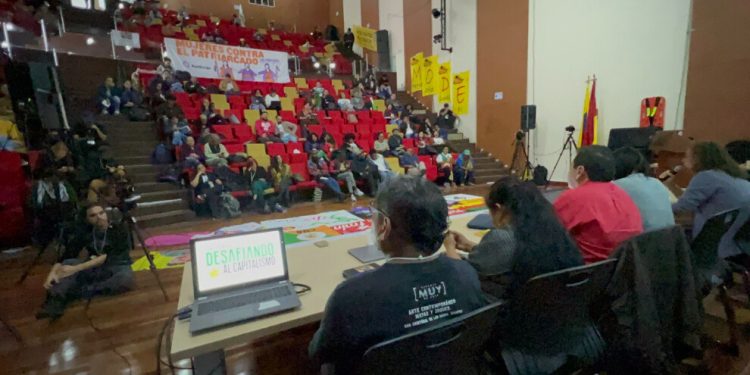BOGOTÁ – The conference titled “Challenging Capitalism Until We Build a Democratic Society”, in which People’s Leader Abdullah Öcalan’s “Democratic Nation and Democratic Confederalism” paradigm was discussed in Bogota, the capital of Colombia, started yesterday with the participation of 50 organizations from 15 countries.
Working groups were formed on the second day of the conference. Working groups were organized in which the economy, state and democracy, ecology, women’s and youth desk also took part in the conference. At these tables, the discussions will continue throughout the day and the results obtained from the discussions will be published on the 3rd day of the conference.
ALTERNATIVE SYSTEMS DISCUSSED
The opening ritual of the conference, which started yesterday, was performed by the Inca people of the Putumayo region on behalf of the members of the Colombian National Congress of Indigenous Peoples. After the opening ritual, a panel titled “Capitalism as a civilizational crisis” was held. Then, the discussions continued under the title of “Capitalism and an alternative to the nation-state system” in the second session. In this session, attention was drawn to the experiences in Latin America.
Alternative systems were discussed in the first panel of the second session titled “Capitalism and an alternative to the nation-state system”. In the panel where guests from Latin America were present, speeches were also made on behalf of Kurdistan.
EXPERIENCES OF INDIGENOUS PEOPLE FOCUS
In the first panel of the second session, the Speaker of the Mexican Indigenous Peoples Congress María de Jesús Patricio Martínez (Marichuy) and Council Member Fernando Domingues Reda made a presentation. In this presentation, he conveyed how the congress of indigenous peoples was formed, from 1966 to the present and the experiences of the last delegation in Europe.
Fernando Domingues Reda emphasized how they carry out work on social transformation and emphasized how the male-dominated mentality should be broken and the training activities carried out for this purpose.
Then, Juan Carlos Jaime from MODEP, the Movement for the Protection of the Rights of Peoples, drew attention to the principle points of their movements and talked about their common struggle against fascism, racism, individualism and sexism. Jaime said, “There are no utopias. We can realize our utopias now and everywhere.”
THE ROLE OF WOMEN IN SOCIAL TRANSFORMATION
Dilda Roj, who took the floor on behalf of the Kurdish Women’s Movement, pointed out the developments in social transformation and explained how the criticism-self-criticism mechanism, the transformation of men, the free spouse life, the transformation of the family, the creation of a democratic family are carried out together with the tools of social transformation. Dilda Roj also emphasized Kurdish People’s Leader Abdullah Öcalan’s contributions to social transformation and stated that despite the intense isolation in İmralı, Önder Öcalan’s contributions to social transformation were met in society and this isolation became meaningless in this way.
Then, the first panel of the second session continued in the form of questions and answers.
A CALL TO RISE THE STRUGGLE AGAINST CAPITALISM
In the second panel, Onic President of the Indigenous Peoples Congress Juan Carlos Jaime stated that it is important for the participants from Kurdistan to be present at this conference and drew attention to the 50-year resistance of indigenous rights in all continents. Connecting the climate crisis to the industrialism ceiling, Gerardo Jumy said that the problems created by capitalism are a human problem and called for a struggle to be raised against it.
Rud Rafael, on behalf of the MTST Movement, conveyed his 25 years of experience and expressed that they are fighting for the land, that a balance should be re-established between the city and the countryside, and that everyone needs a dignified shelter.




